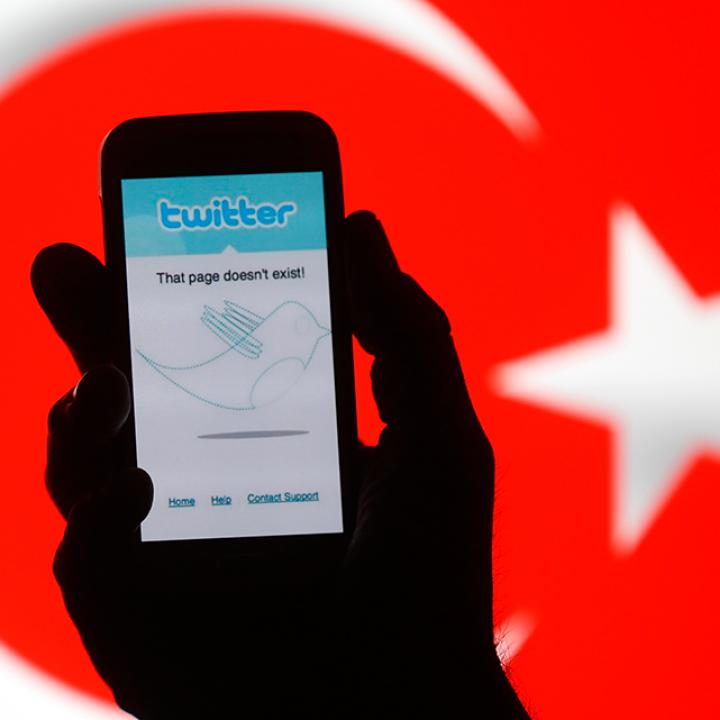

Turkey's leaders should acknowledge that banning social media sites is neither feasible nor conducive to developing a more advanced economy.
On March 20, one day after Prime Minister Recep Tayyip Erdogan threatened "to root out Twitter," Turkish users were inexplicably blocked from accessing the popular social media site. According to the New York Times, the prime minister's office issued a statement that the decision to ban Twitter was imposed due to the site's "lack of cooperation after four local courts ruled that certain content must be removed."
Turkey is one of the world's top-ten Twitter nations, with twelve million users across the country. The ban will be difficult to enforce, since citizens can still access any blocked website via Internet servers based outside the country or post tweets by sending text messages. Whether or not the ban is sustainable, it may be more symbolic than practical, highlighting the challenges that Erdogan faces as Turkey readies for nationwide local elections on March 30 and presidential elections over the summer.
TURKEY'S NEW MIDDLE CLASS HAS SOCIAL MEDIA SAVVY
Turkey's economic transformation in the past decade under Erdogan's Justice and Development Party (AKP) has created a powerful middle class. Ironically, it is this section of the population that is increasingly challenging the government. Since last year, Turkey has been rocked by antigovernment rallies, most notably the ones that broke out in Gezi Park and Taksim Square, in which citizens have demanded broader rights, including respect for freedom of association, assembly, media, and expression. Twitter and other social media sites, which are mainly accessed on expensive smartphones, have been instrumental in helping this wealthy and literate middle class stage protests against the government. According to a 2013 study by New York University's Social Media and Political Participation laboratory, only 30 percent of the tweets about Egypt's 2011 protests originated in Egypt and were written in Arabic; in contrast, 90 percent of the tweets about the Gezi Park protests were sent from Turkey and written in Turkish.
More recently, social media sites have figured prominently in the battle between Erdogan and the Gulen Movement, an influential network of former Erdogan supporters who have broken rank with him since December. The leader of the movement, Fethullah Gulen, currently resides in the United States, and Erdogan has used this fact to criticize not only America, but also various international institutions and social media sites such as Twitter, alleging that they are complicit in a conspiracy against him and the Turkish government. Twitter and Facebook have also been used to air corruption allegations against the government, hurting Erdogan's credibility and sullying his political reputation. While polls suggest his party is still likely to win the March 30 elections, they also indicate that the AKP's popularity may be slipping as a result of ongoing and virtual antigovernment campaigns.
Erdogan's opponents -- whether liberal, secular, leftist, or Gulen supporters -- have been taking to social media networks to challenge him. His response, particularly the decision to block Twitter, is telling of Turkey's obstacles moving forward. Some ten million of the country's Twitter users have already found other ways to log on and ignore the ruling, suggesting that Erdogan's efforts to clamp down on freedom of expression and keep his opponents at bay may not work.
U.S. ROLE
In response to the Twitter ban, the United States should consider communicating the following points to Ankara:
- Erdogan has made Turkey a middle-income country in the past decade, and it now has a chance to become an advanced economy if it builds a values-based economy and information society. In other words, Erdogan's Turkey can continue to rise if it transforms from a country that exports cars to a country that is a hub for Google. Turkey's creative classes will flee if the government continues on it current path, and those outside the country will avoid it if Turkey's leaders cannot provide unfettered access to the Internet, ensure freedom of expression, media, assembly, and association, and respect individual, environmental, and urban spaces -- all of which were key demands of the Gezi Park protestors and Erdogan's critics on the political left and right.
- If Turkey remains an open society, it will continue to rise. This upward trajectory is in everyone's interest, especially Erdogan's. Since 2002, his party has won three parliamentary elections and two nationwide local elections primarily by delivering phenomenal economic growth. And Turkey has grown because it has attracted international investment, which averages approximately $40 billion annually. The flow of foreign money will cease if Turkey fails to remain an open society; international investors will pull out if popular social media sites are banned. Erdogan's success in the forthcoming elections will depend on his ability to maintain Turkey's image as a country open for business and ideas.
- Turkey's growth and Erdogan's political fortunes are closely linked. They are also connected to the global economy and the freedoms available to citizens of most developed countries.
Soner Cagaptay is the Beyer Family Fellow and director of the Turkish Research Program at The Washington Institute. His latest book is The Rise of Turkey: The Twenty First-Century's First Muslim Power.



